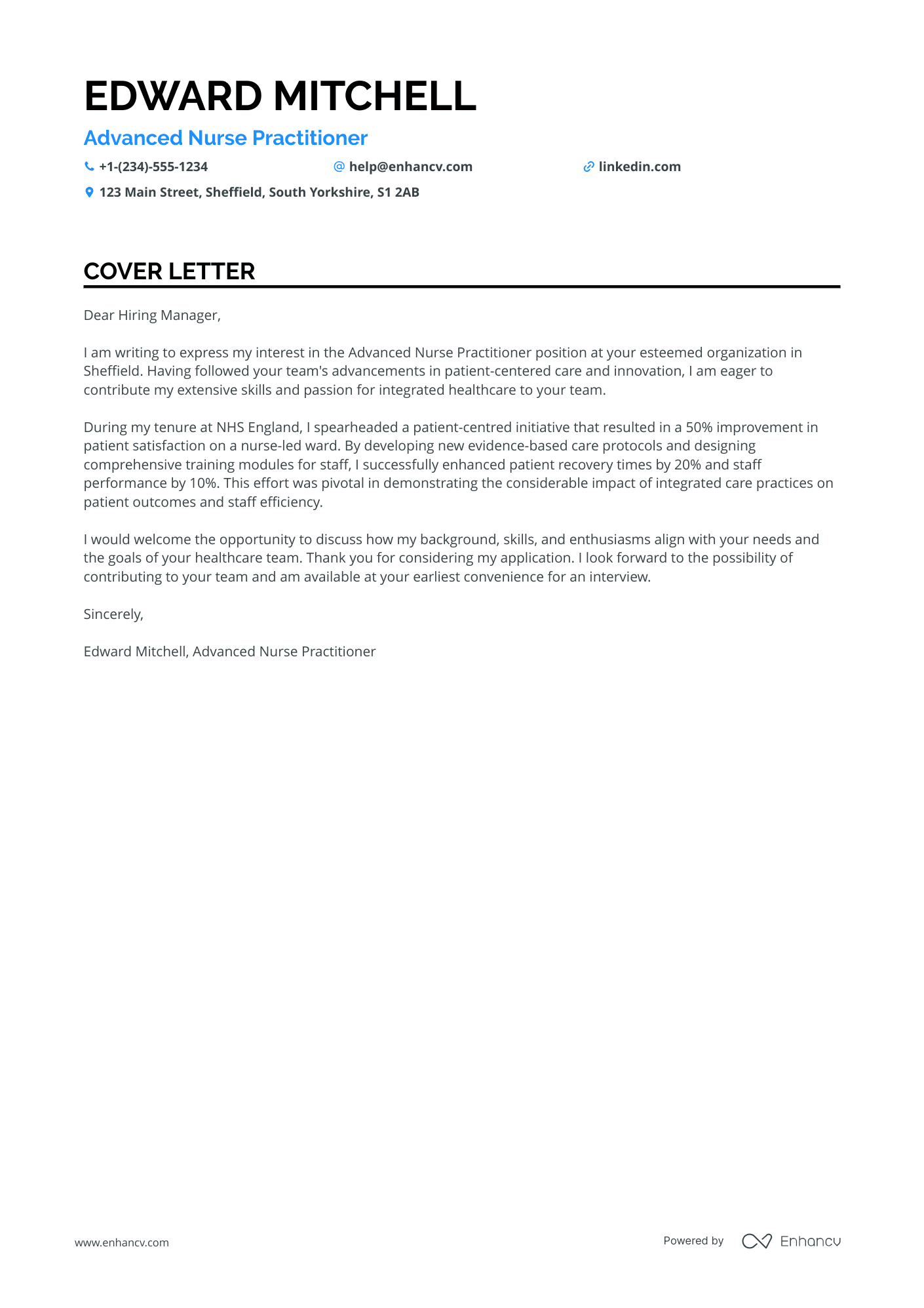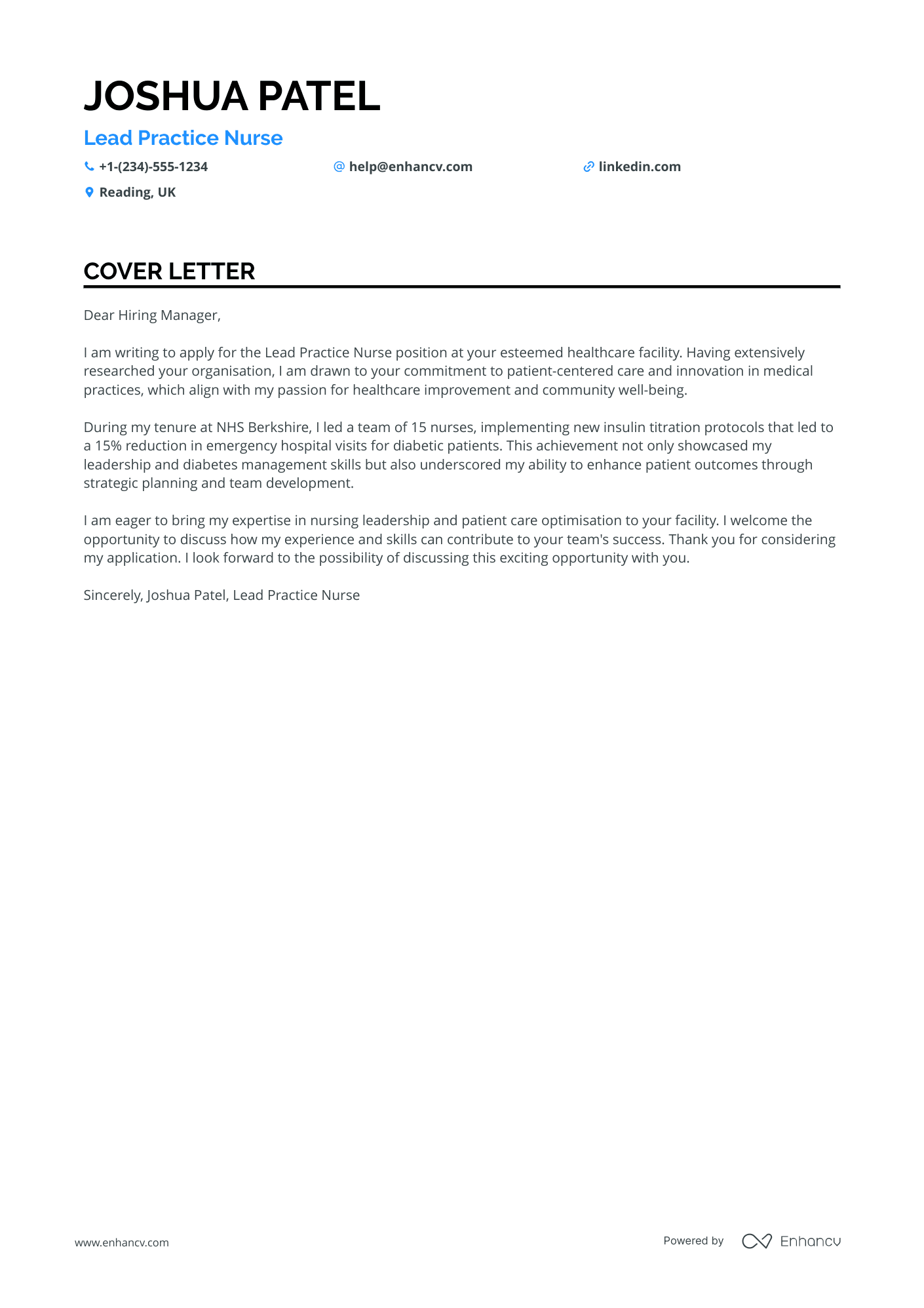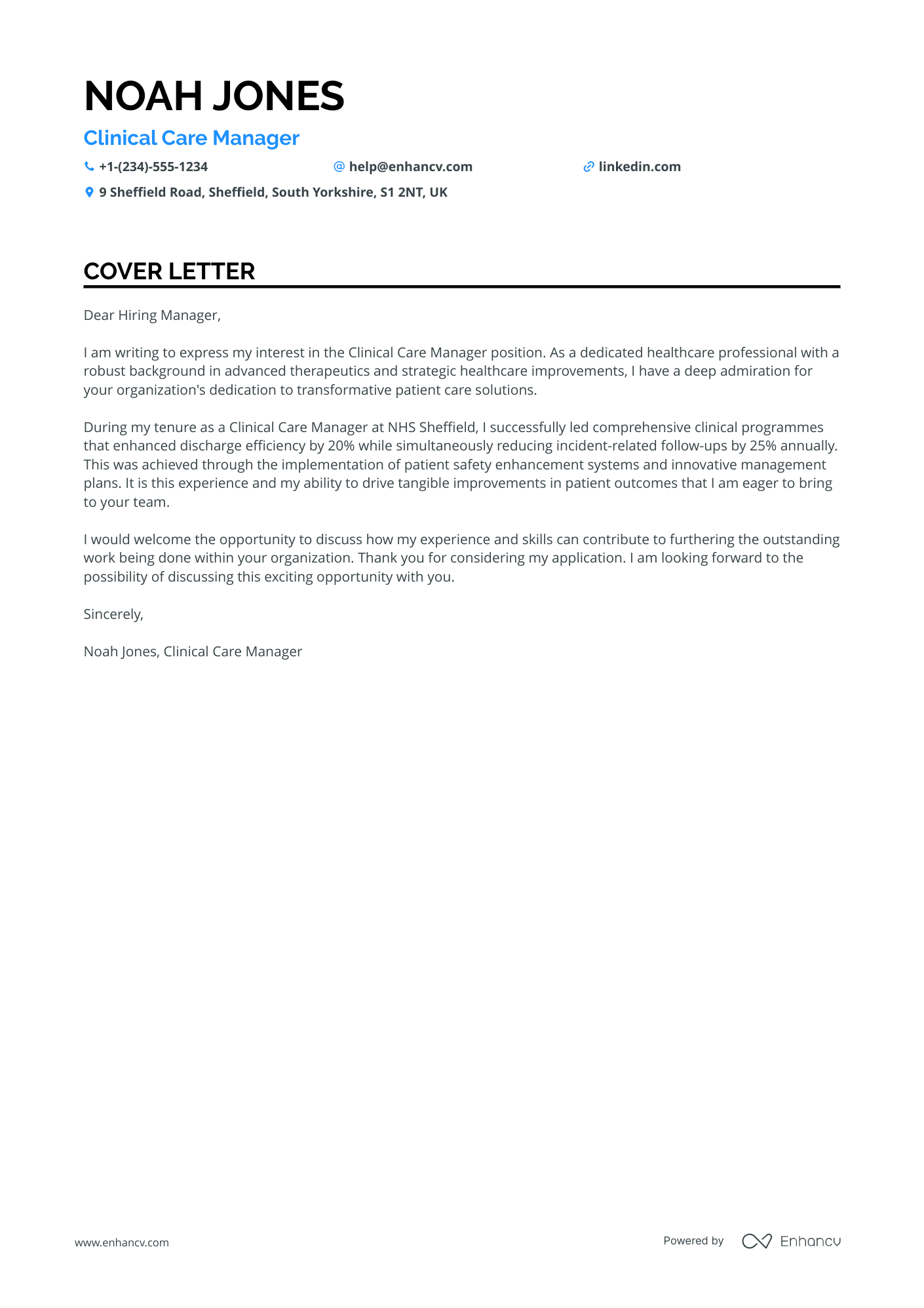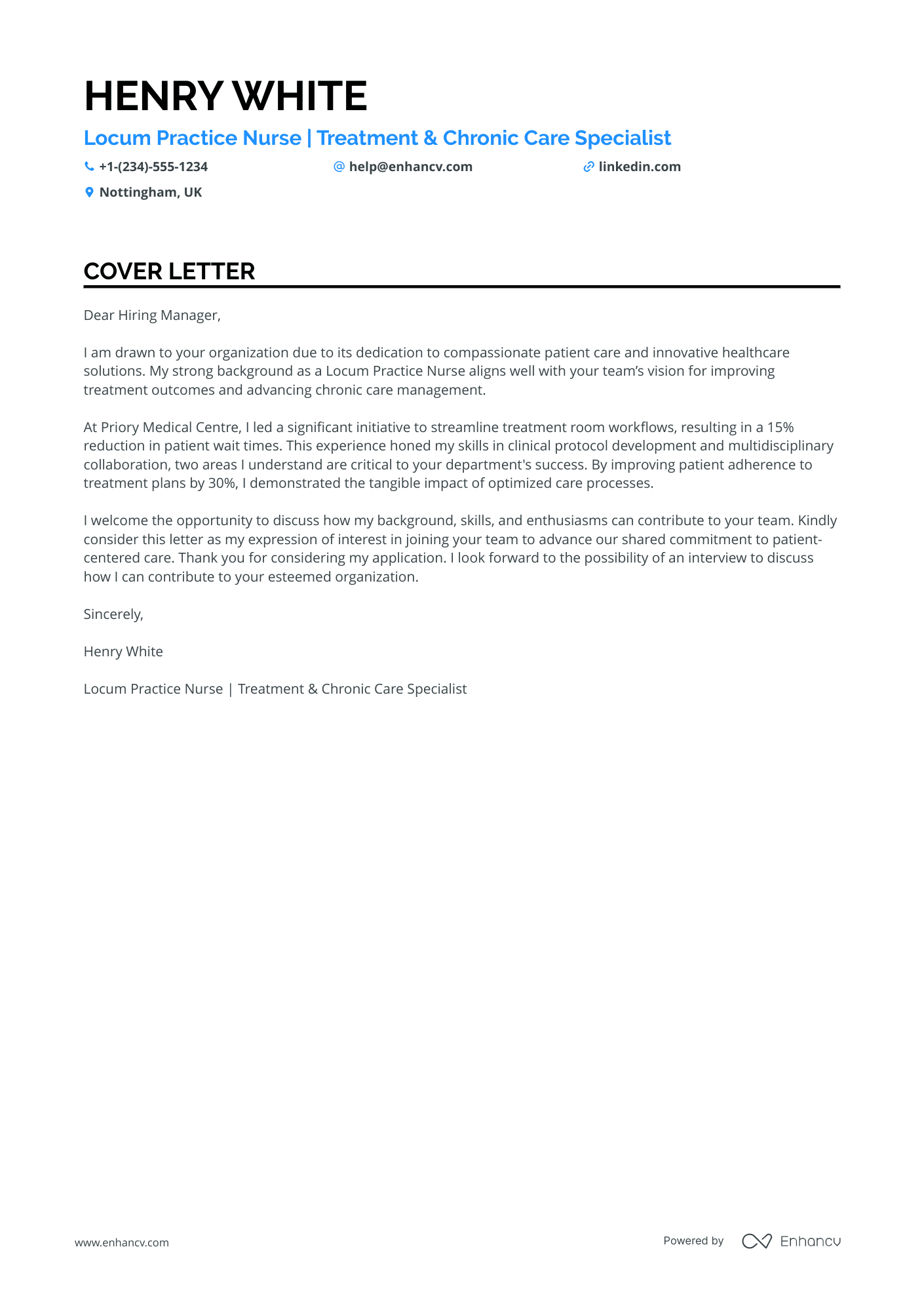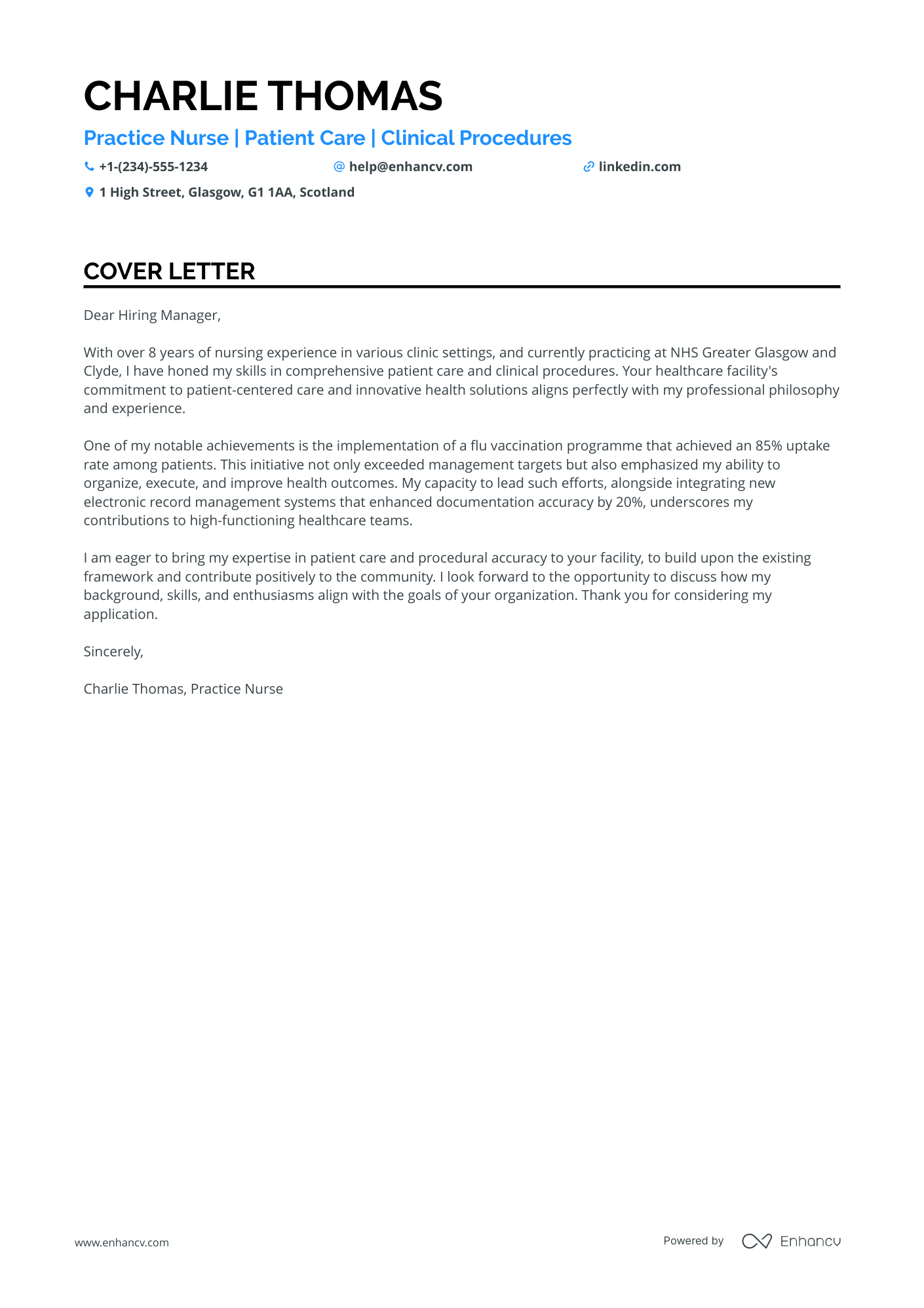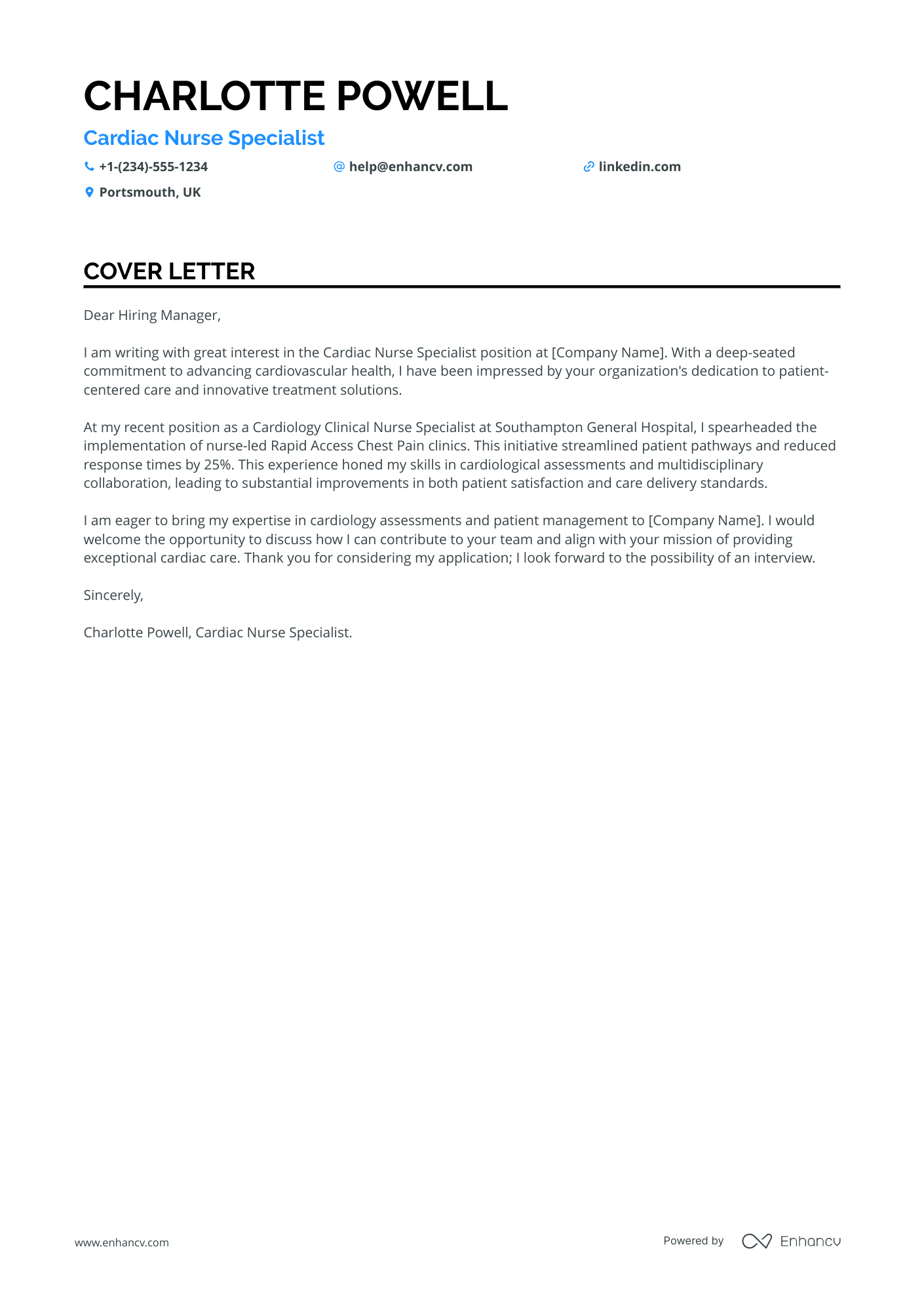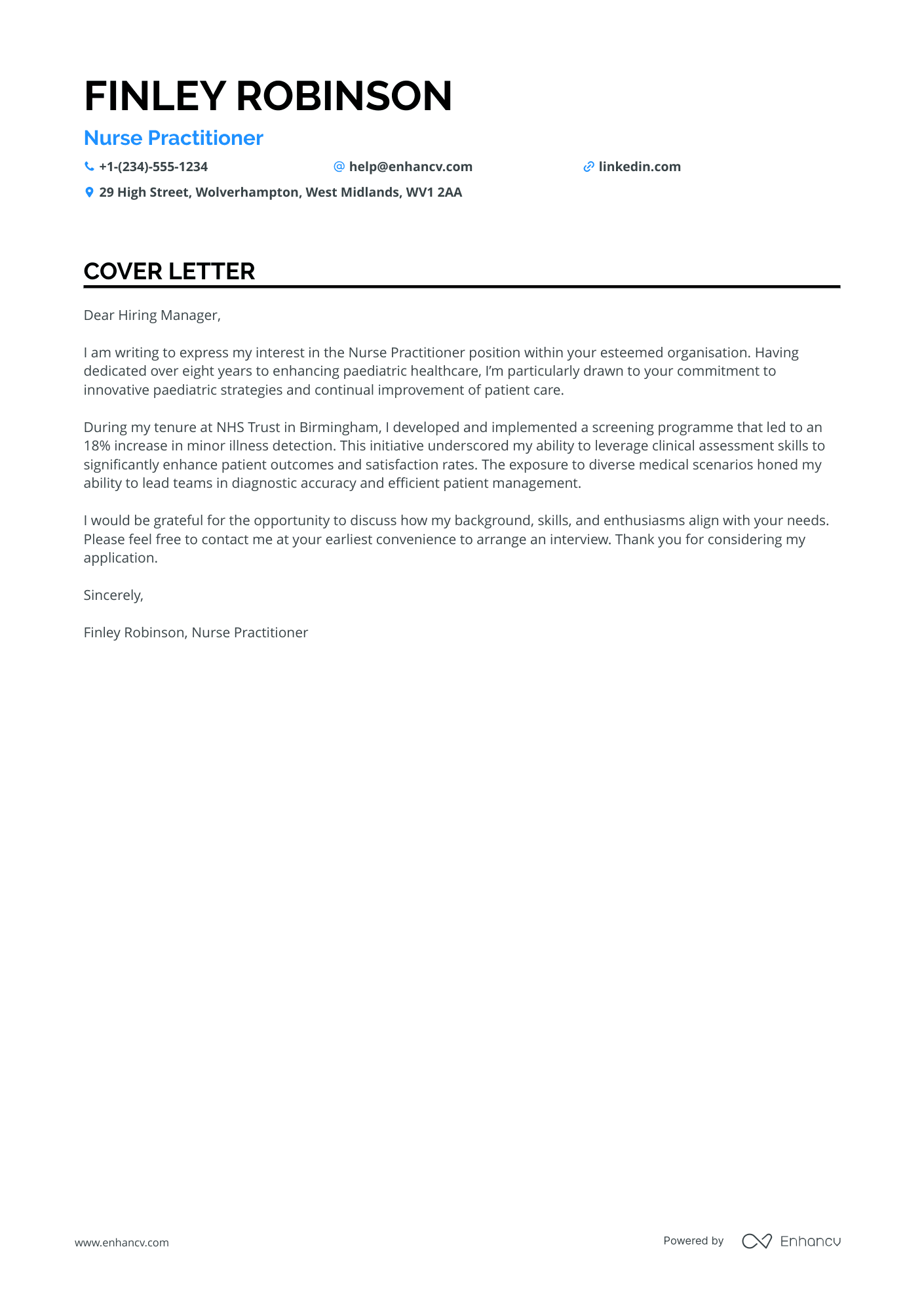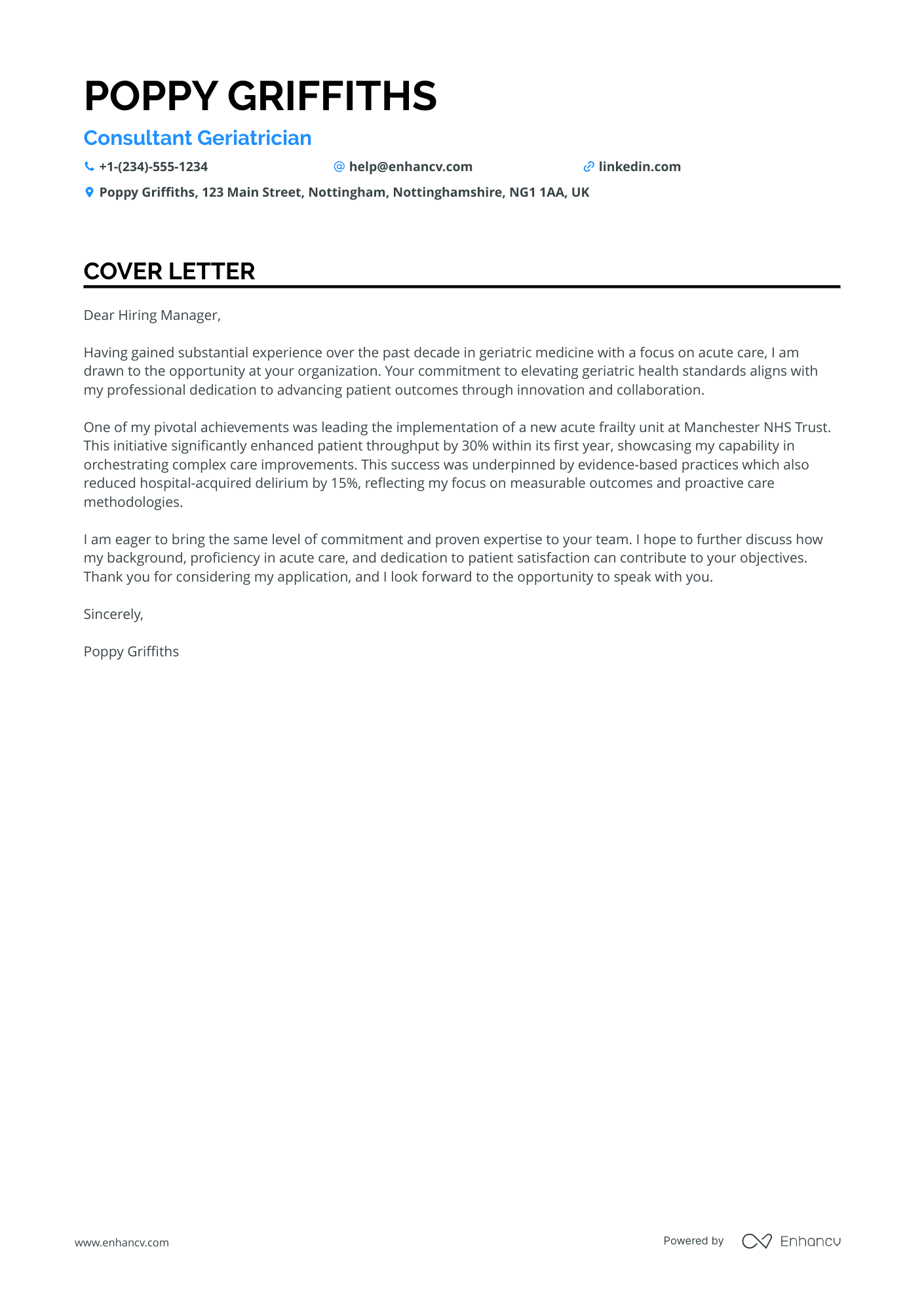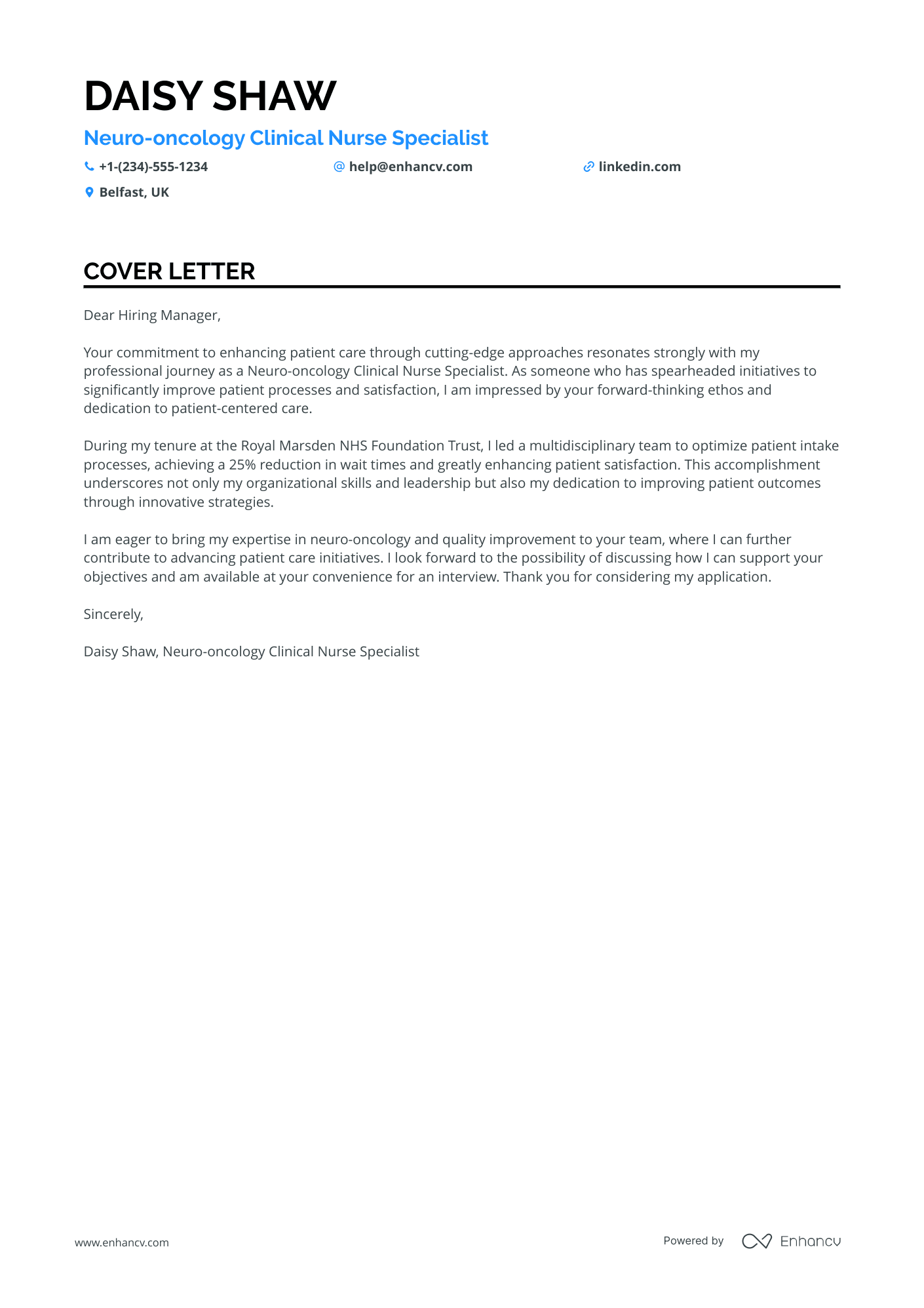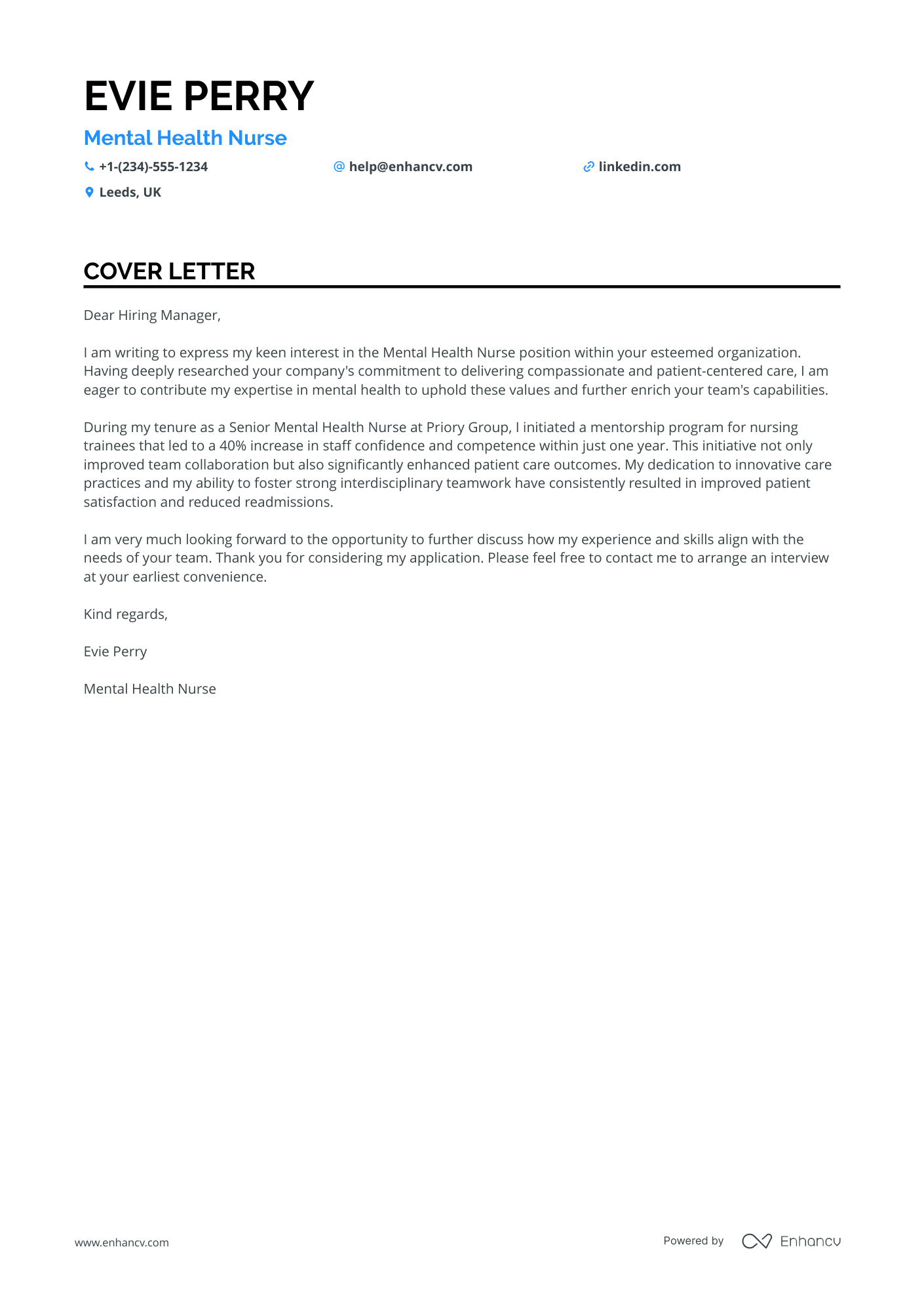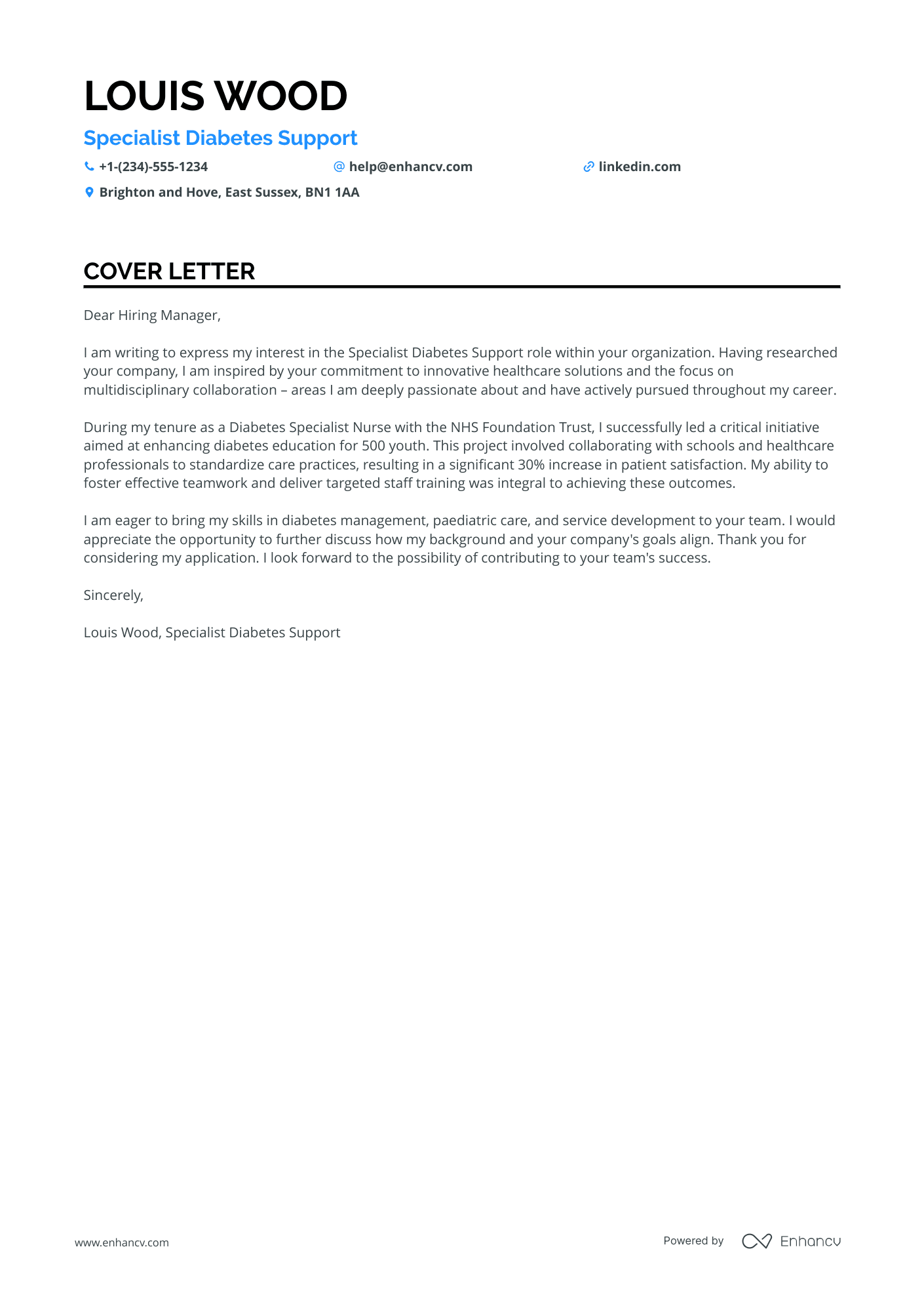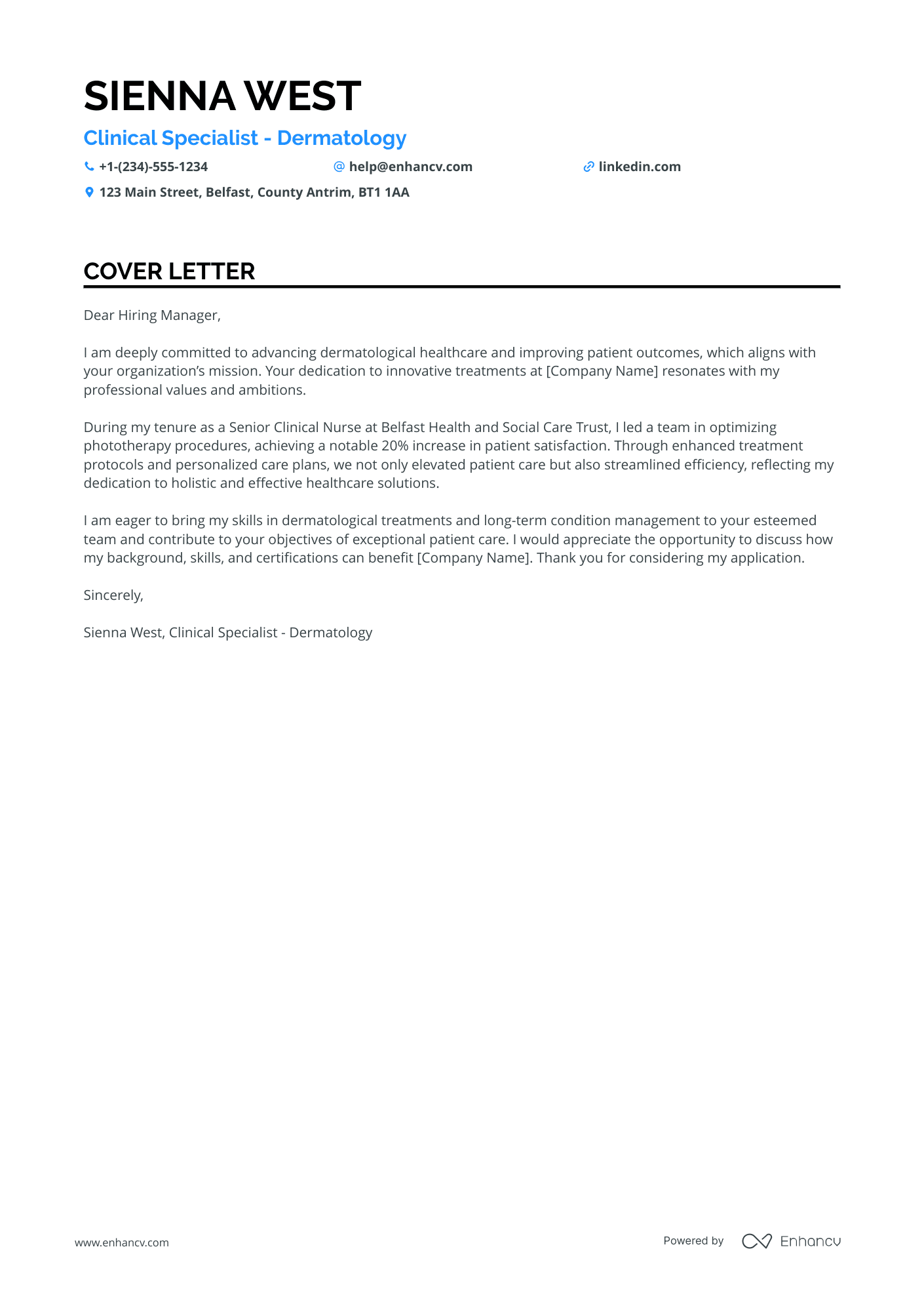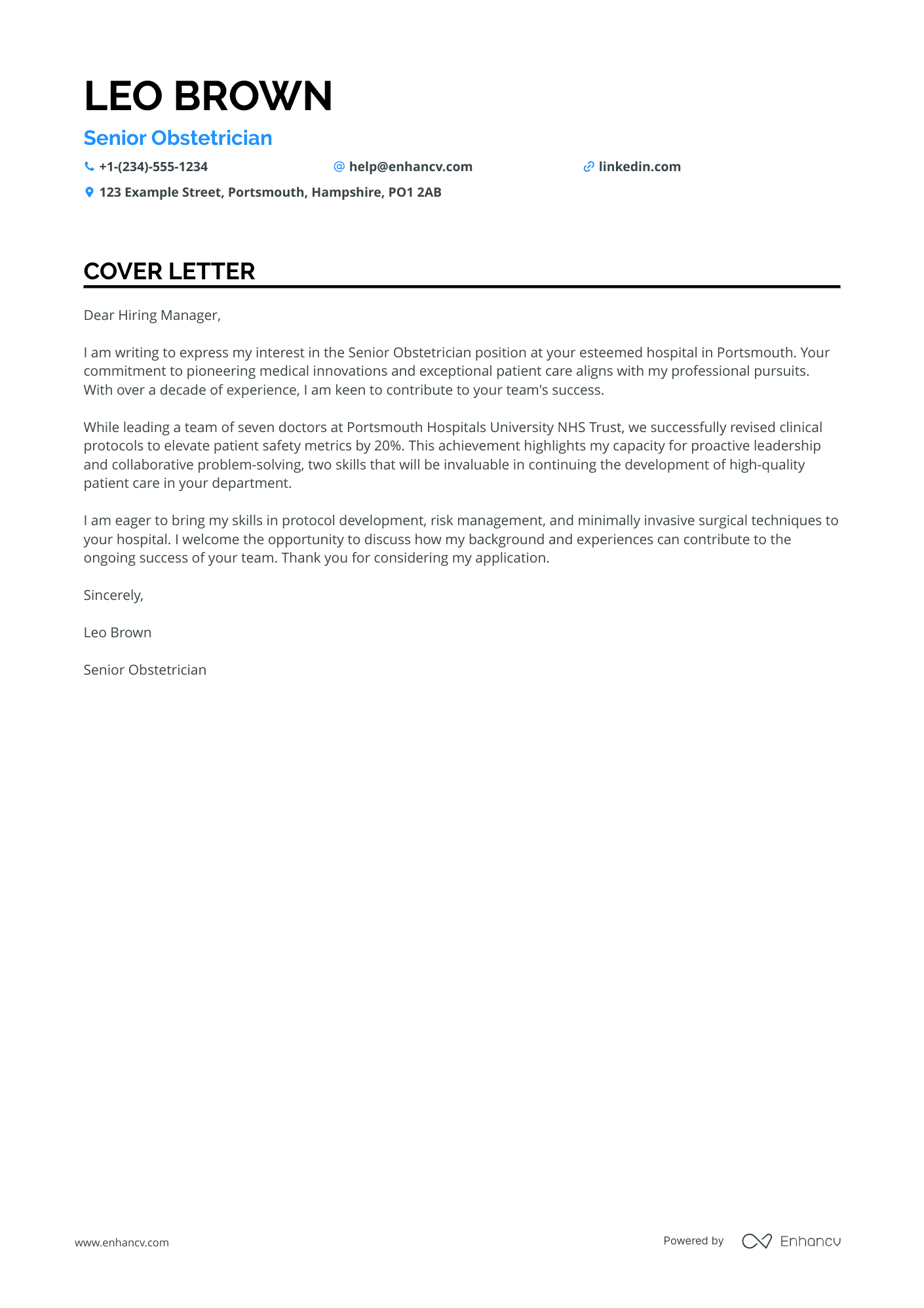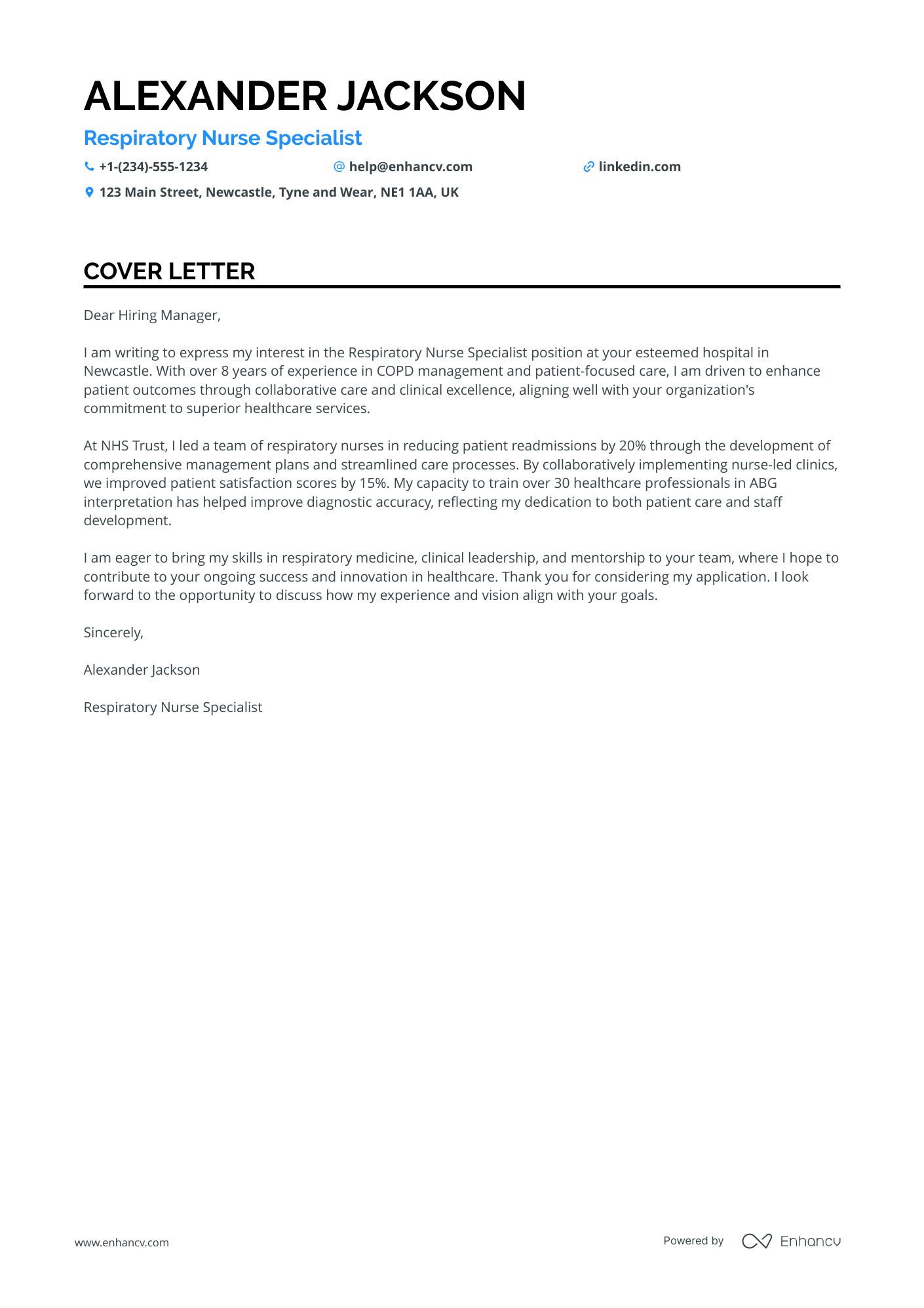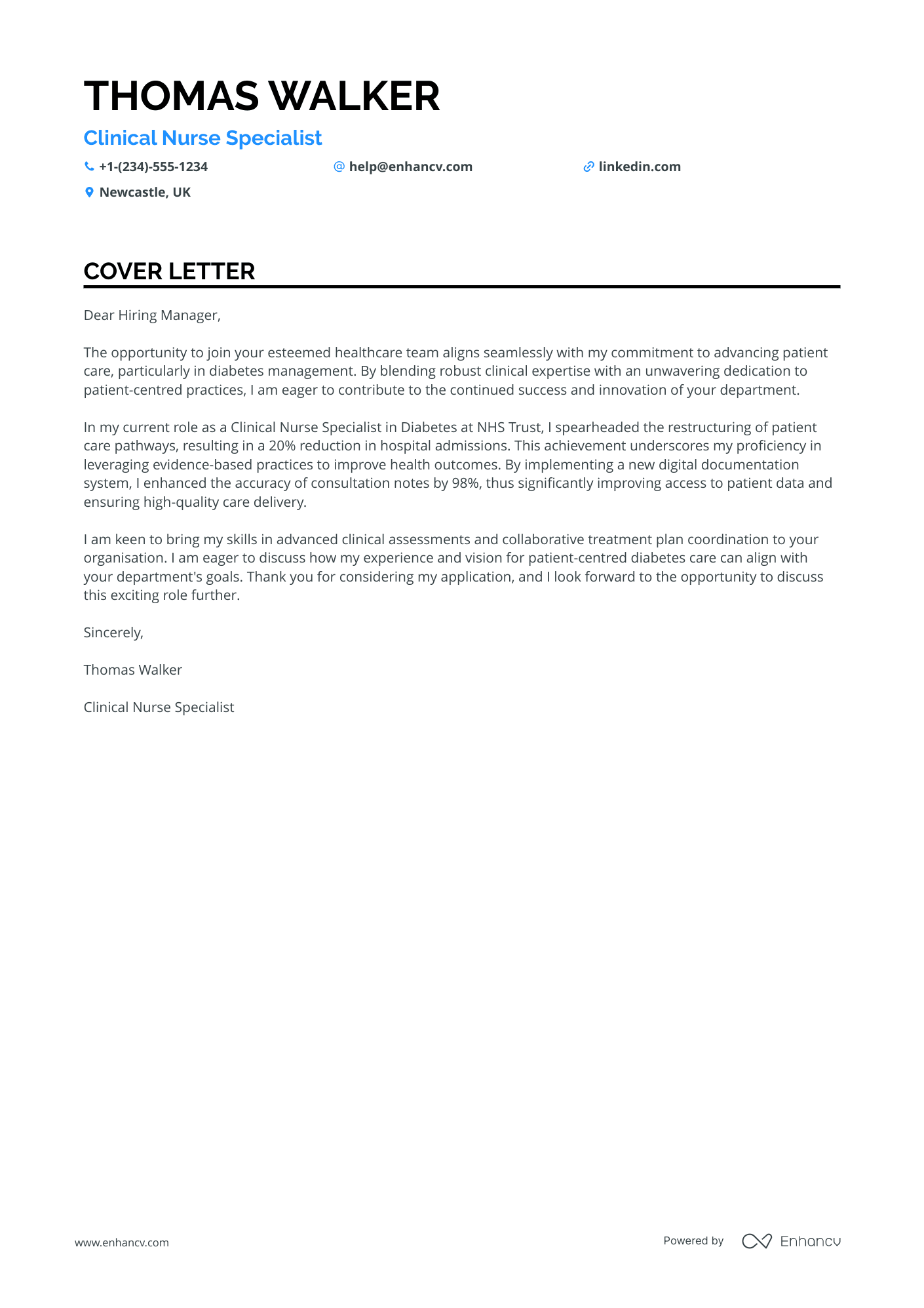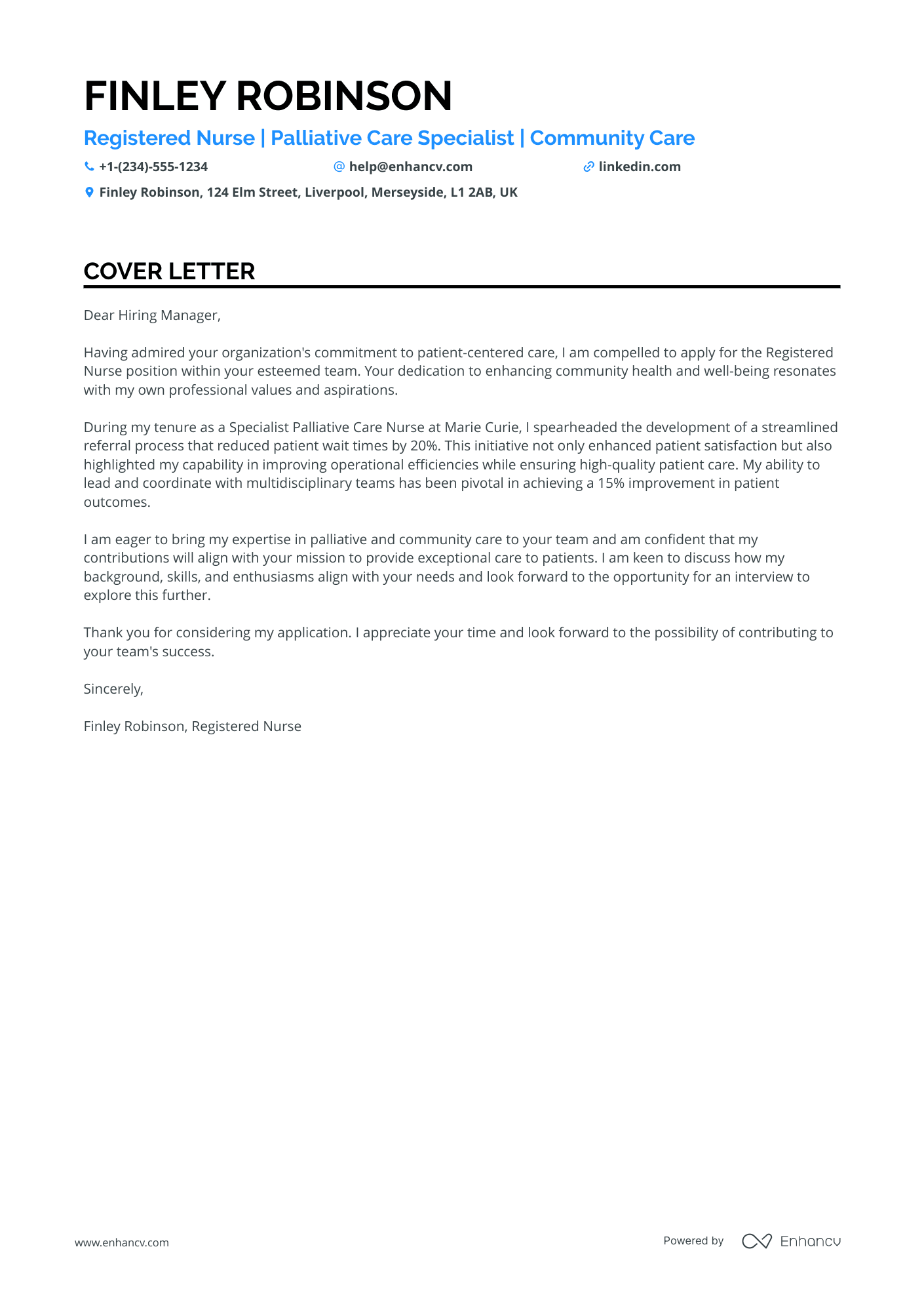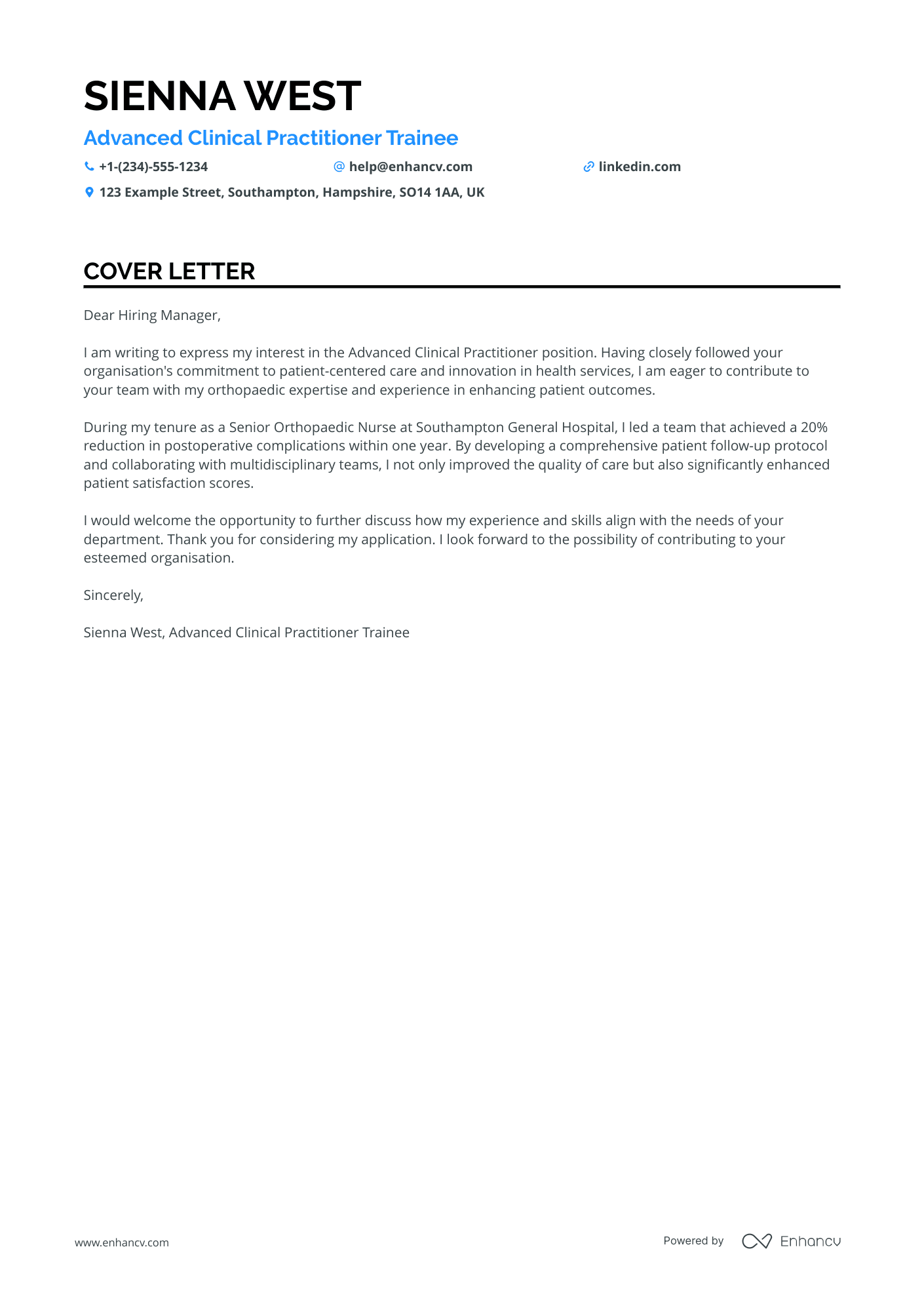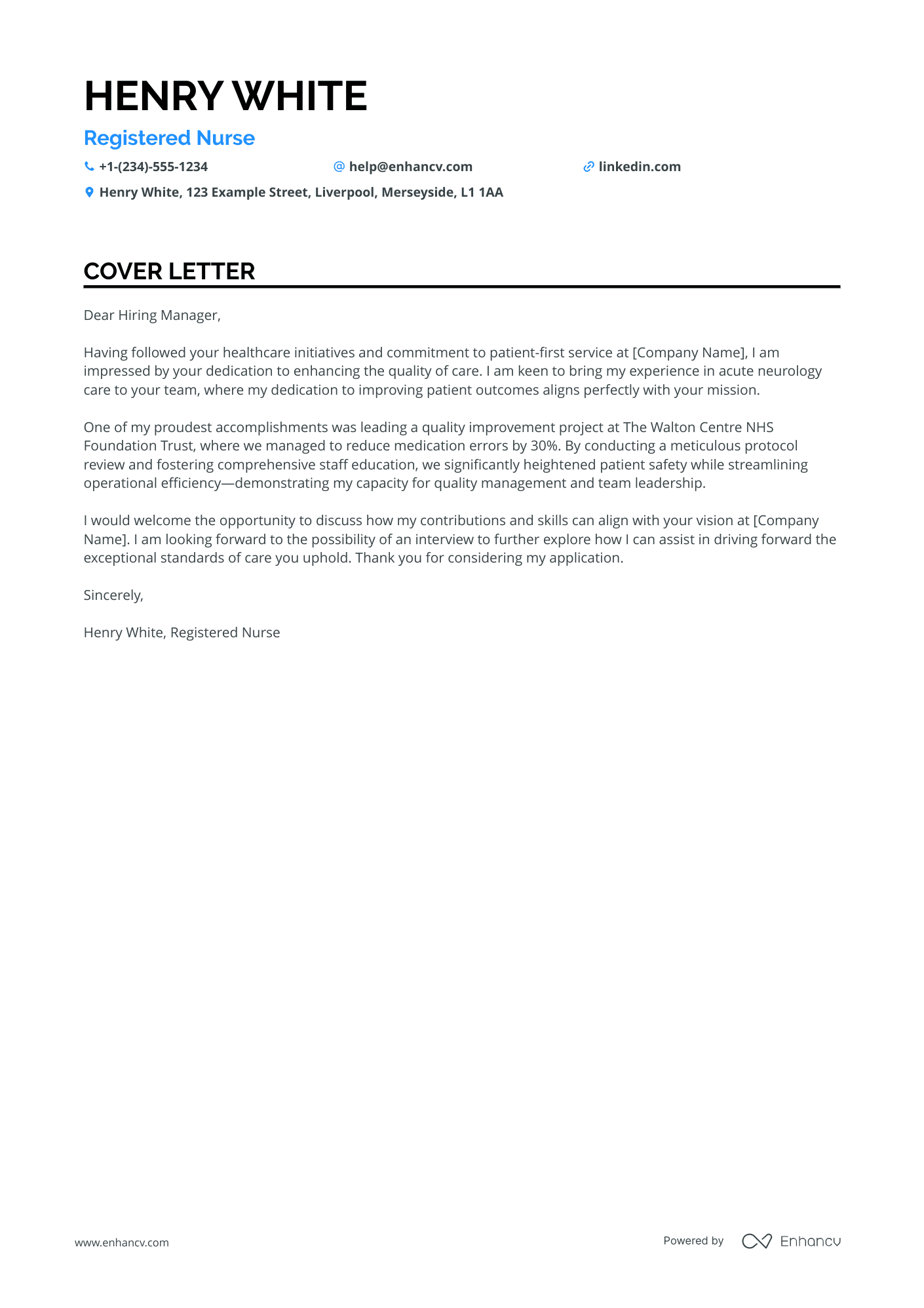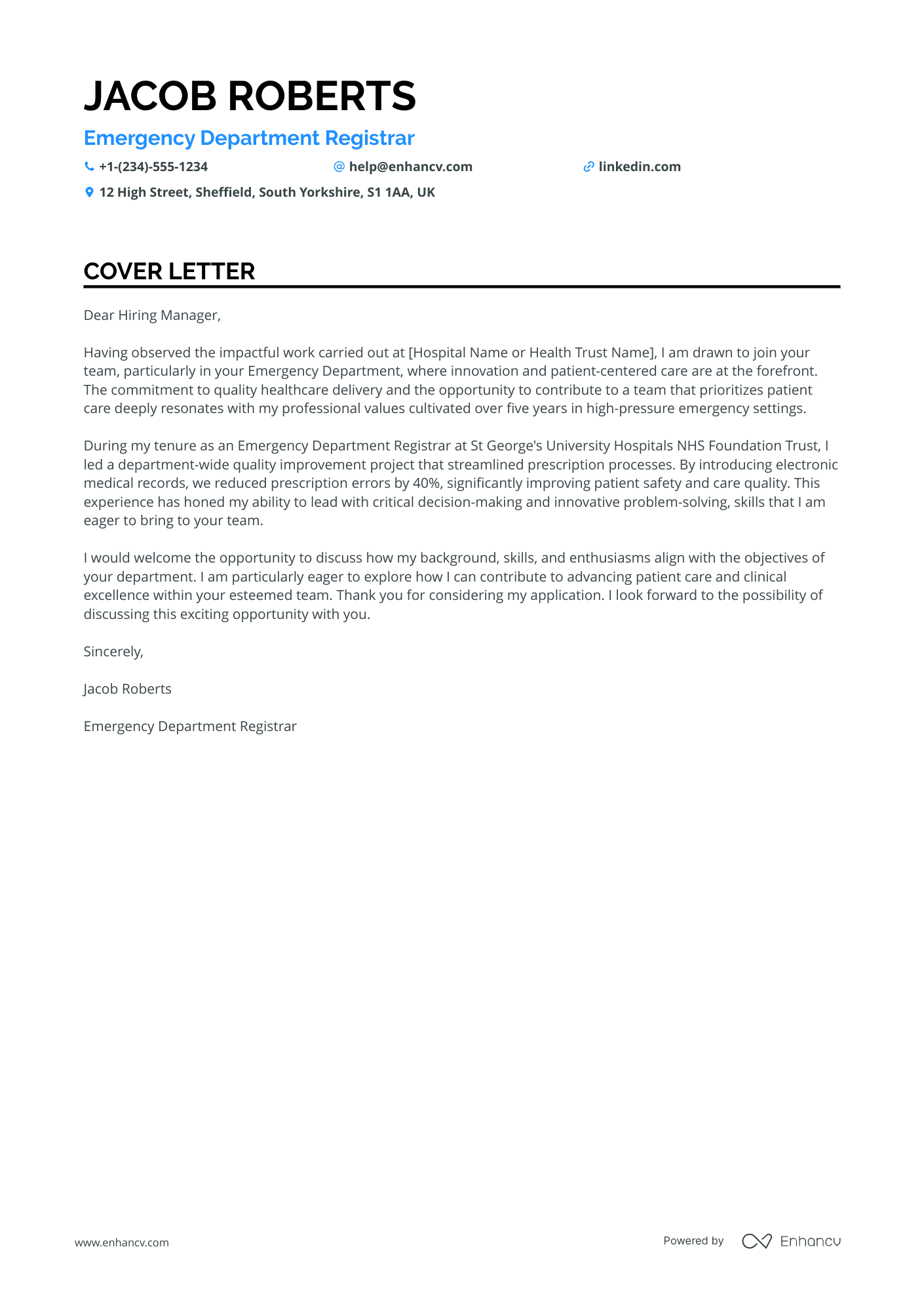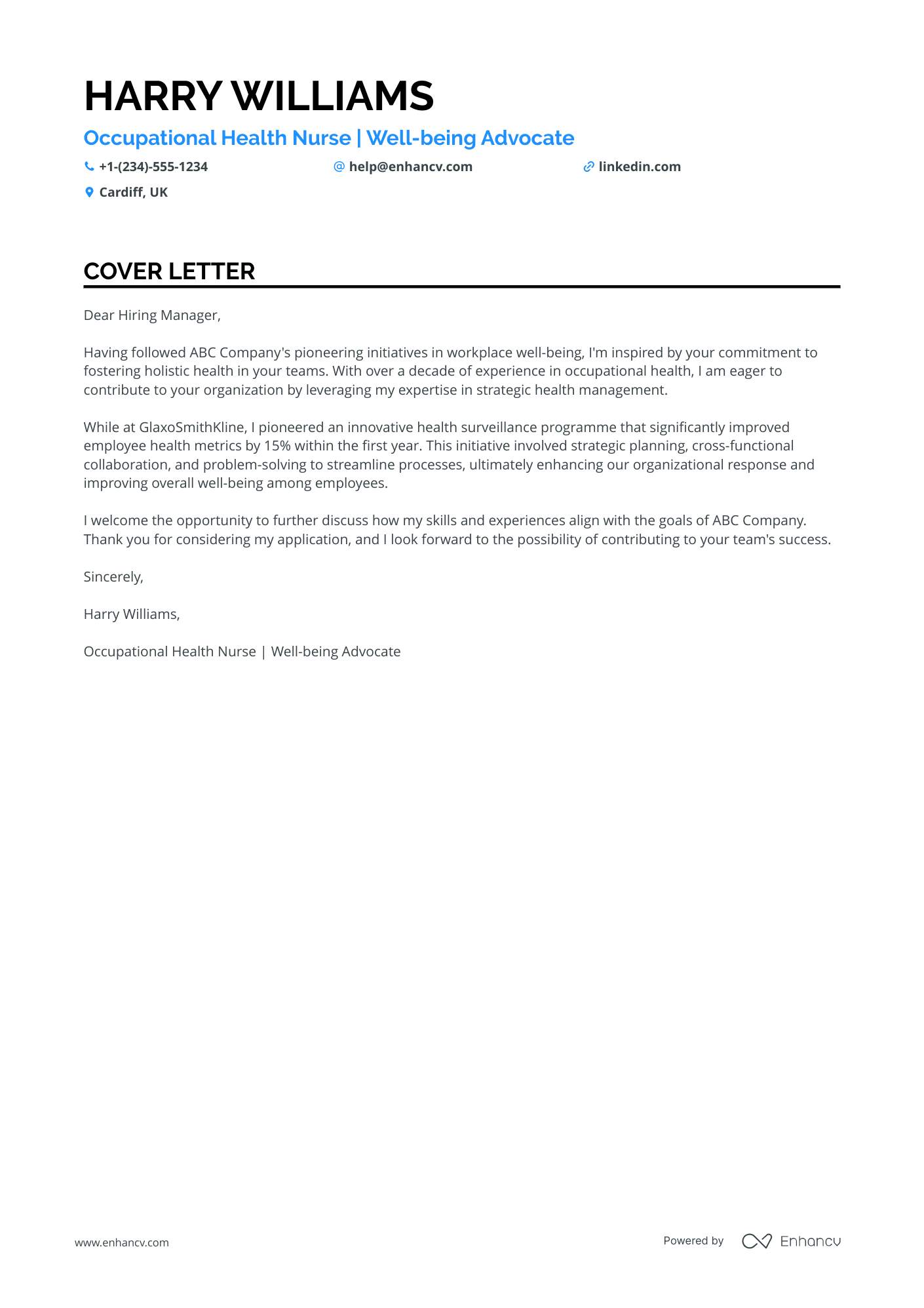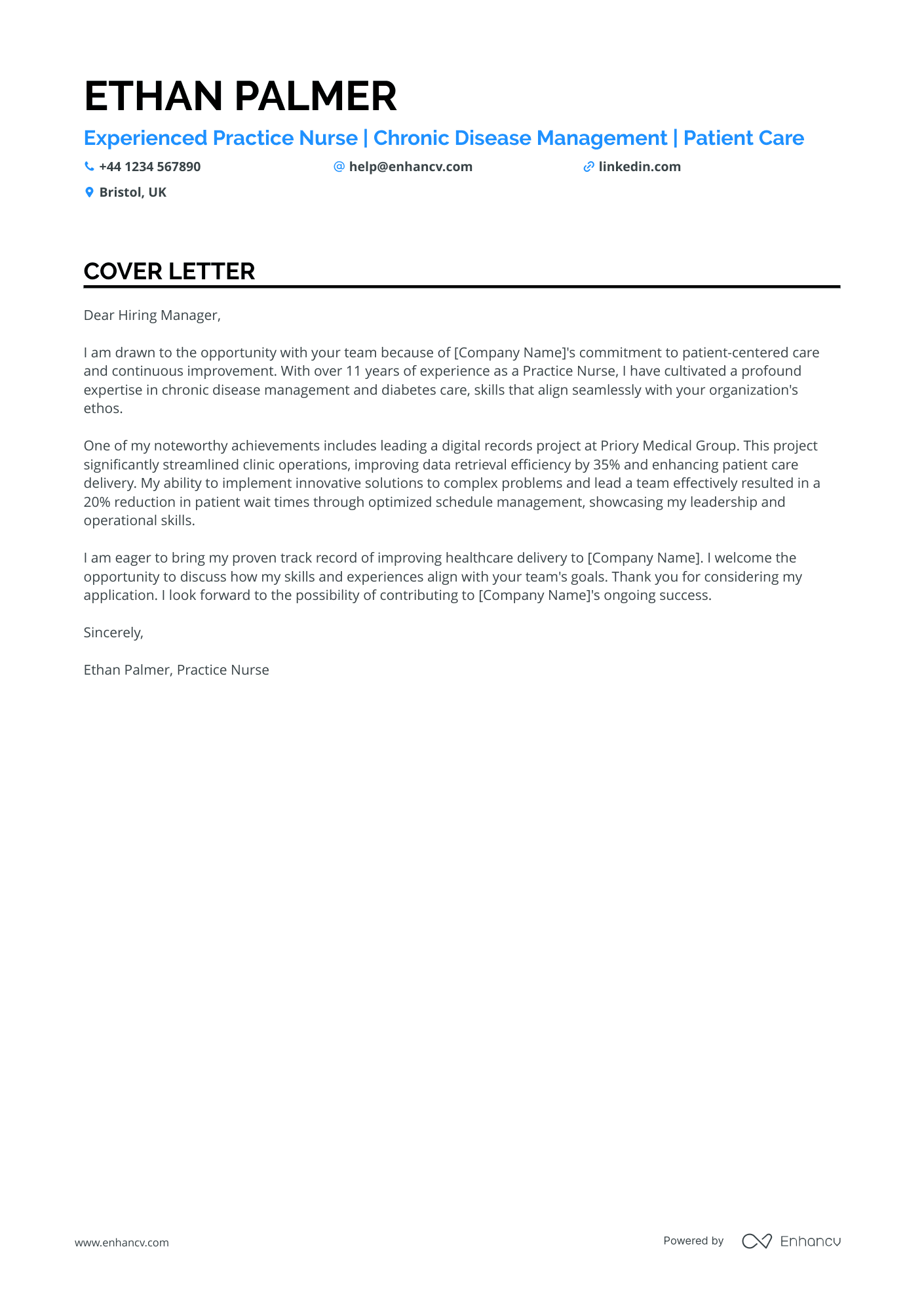You want your cover letter to strike the perfect balance between being professional and showing some personality. But how do you achieve this?
If you write too formally, your tone may come across as stiff. If you're too casual, it may sound overly conversational.
While modesty is always valued, how can you confidently present your skills without sounding arrogant or boastful?
This guide will help you find the right balance, ensuring your cover letter is both professional and personable, while focusing on the key job requirements.
Cover letter examples for practice nurse
By Experience
Advanced Practice Nurse
- Highlighting Specialised Experience: The cover letter emphasises Edward's extensive 8-year experience as an Advanced Nurse Practitioner, which is crucial for establishing credibility in patient care and leadership roles.
- Showcasing Measurable Outcomes: It provides specific achievements with quantifiable results, such as a 50% improvement in patient satisfaction and a 15% improvement in clinical outcomes, illustrating the applicant's impact on previous roles.
- Focus on Leadership and Team Coordination: The document underlines Edward's capability to lead multidisciplinary teams and enhance coordination, key skills for leadership roles within a healthcare setting.
- Specialised Certifications and Training: The inclusion of certifications like the V300 prescribing course highlights qualifications crucial for the advanced nursing position, showcasing professional competence and commitment to ongoing education.
Lead Practice Nurse
- Specialisation in Diabetes Management: Highlighting over 10 years of experience and specialised courses in diabetes care shows a strong fit for roles focused on chronic disease management.
- Nursing Team Leadership: Describing specific achievements in mentoring and improving team performance can attract employers looking for proven leaders in clinical settings.
- Process Improvements and Efficiency: Mentioning achievements such as implementing new protocols and operational efficiency demonstrates an ability to innovate and improve healthcare operations.
- Community Health and Patient Engagement: Focusing on efforts in patient education and community health initiatives aligns with healthcare roles seeking candidates who can improve patient outcomes and engagement.
Senior Practice Nurse
- Highlighting Key Achievements: The cover letter efficiently showcases Noah's specific accomplishments, such as improving discharge efficiency by 20% and increasing patient adherence by 15%. This quantifiable data is crucial in demonstrating tangible impacts in clinical care management.
- Emphasising Relevant Experience: Noah’s diverse roles across different NHS Trusts are leveraged to illustrate comprehensive expertise in clinical care, with a focus on governance, strategic planning, and education. These experiences align well with the demands of a Clinical Care Manager.
- Showcasing Education and Professional Development: The mention of a Master of Science in Nursing and relevant courses like Advanced Clinical Governance underscores Noah's commitment to continuous professional development, a key aspect for advanced roles in clinical care.
- Effective Use of Skills and Passion: By aligning skills such as strategic leadership and patient safety enhancement with his passions, Noah demonstrates a well-rounded profile that matches the expectations of a Clinical Care Manager role focussed on patient welfare and innovative practices.
Locum Practice Nurse
- Highlight relevant certifications and courses, such as the "Advanced Chronic Disease Management" course, which demonstrate the applicant's specialised knowledge and ongoing professional development in managing long-term health conditions.
- Emphasise quantifiable achievements, such as the "Patient Care Excellence Award" which underscores the applicant's success in implementing effective chronic disease management protocols that improve patient outcomes.
- Showcase relevant skills and their impact, like "Multidisciplinary Collaboration" and "Patient Education", which are crucial for a locum practice nurse role that involves working with diverse health professionals and delivering patient-centred care.
- Utilise language proficiency as an asset, for instance mentioning English and Spanish skills, which could be beneficial in a diverse healthcare environment to communicate effectively with a broader patient demographic.
By Role
General Practice Nurse
- Highlighting the "Advanced Spirometry Certification" and experience in respiratory health aligns with the specialised care required for a Practice Nurse role.
- Emphasising achievements such as a 30% improvement in patient satisfaction and an 85% flu vaccination uptake showcases impact through patient care and programme management.
- Detailing the integration of a new electronic record management system underscores proficiency in documentation accuracy and technical adaptability, critical for healthcare settings.
- Listing both leadership in training junior nurses and developing educational materials demonstrates a commitment to professional development and patient education.
Specialist Practice Nurse in Cardiology
- Highlighting Specific Certifications: The mention of completing "Advanced Cardiology Nursing" and "Nurse-led Clinic Management" courses from recognised institutions like Robert Gordon University and King's College London demonstrates specialised knowledge and leadership skills crucial for a Cardiac Nurse Specialist role.
- Emphasising Proven Achievements: Describing tangible results such as the implementation of Rapid Access Chest Pain Clinics that reduced cardiology waiting times by 25%, underscores the ability to enhance patient care efficiently.
- Showcasing Leadership and Innovation: Highlighting leadership roles in developing clinical protocols and initiatives that earned an NHS Innovation Recognition conveys the candidate’s capacity to drive improvements and lead healthcare advancements.
- Leveraging Experience and Impact: Detailing past experiences leading to a 30% increase in patient satisfaction and a 40% improvement in service delivery standards articulates the candidate's positive impact on patient outcomes and team efficiencies.
Practice Nurse in Paediatrics
- Paediatric Focus: Emphasising a robust background in paediatrics through both professional experience and targeted courses like "Paediatric Minor Illness Management" highlights specialised expertise crucial for roles centred around child healthcare.
- Leadership in Safeguarding: Demonstrating leadership capabilities, particularly in the context of safeguarding protocols, showcases the ability to enhance compliance and contribute to improved healthcare standards.
- Clinical Excellence Recognition: Highlighting the "Clinical Excellence Award" not only serves as a testament to outstanding performance but also underscores a proven track record in implementing patient-oriented improvements.
- Commitment to Continuous Development: Illustrating an active interest in continuing professional development reflects a dedication to maintaining cutting-edge knowledge and skills in healthcare, which is highly valued in a clinical setting.
Practice Nurse in Geriatrics
- Emphasising certifications in geriatric medicine, such as the Advanced Geriatric Medicine Certification, showcases specialised knowledge and commitment to the field, making the application stand out for roles focused on elderly care.
- Highlighting leadership in implementing an acute frailty unit and reducing patient recovery time underscores the ability to drive significant improvements in patient care and operational efficiency, essential for a Consultant Geriatrician role.
- Showcasing involvement in innovative research projects, like geriatric oncology, demonstrates a commitment to advancing medical knowledge, a valuable trait for professionals engaged in healthcare advancements and education.
- Inclusion of experience in training and mentoring, with demonstrable improvements in staff performance, positions the applicant as a valuable contributor to team development and educational initiatives within healthcare settings.
Practice Nurse in Oncology
- Highlighting Relevant Experience: The cover letter effectively outlines Daisy Shaw's extensive experience in neuro-oncology, with specific achievements such as reducing patient wait times and increasing treatment compliance, which are crucial for a Clinical Nurse Specialist role focused on patient-centred care and quality improvement.
- Emphasising Leadership and Organisational Skills: Mentioning leadership in leading multidisciplinary teams and initiating quality improvement projects, showcasing the ability to drive team success and improve patient outcomes, aligns perfectly with the desired qualities for a Clinical Nurse Specialist.
- Showcasing Specialised Certifications: Inclusion of the Advanced Oncology Nursing Certification from The Royal Marsden School underscores specialisation, increasing credibility for a role in neuro-oncology and palliative care.
- Demonstrating Communication and Patient Education Skills: By detailing the implementation of nurse-led clinics that improved patient education and treatment adherence, the letter highlights essential skills for enhancing patient experience and satisfaction.
Practice Nurse in Mental Health
- Showcase Leadership Experience: Highlight roles like a Senior Mental Health Nurse where leadership influenced team collaboration and patient outcomes, demonstrating the capability to lead and mentor effectively.
- Emphasise Patient Care and Outcome Improvement: Mention achievements like reducing patient readmission rates by 30%, illustrating the candidate's effectiveness in delivering quality patient care.
- Highlight Continuing Education and Certifications: Include certifications such as the Advanced Care Planning Certification and Compassionate Leadership Course to demonstrate ongoing professional development in relevant areas.
- Focus on Achievements and Innovations: Stress initiatives such as developing new therapy approaches, enhancing staff competence, and facilitating teamwork to show improvement-focused mindset and creativity.
Community Practice Nurse
- Highlight of Specialised Experience: Clearly demonstrates over 10 years of experience in diabetes care, with a focus on children's services, which is crucial for a Specialist Diabetes Support role.
- Impactful Achievements: Includes quantifiable achievements such as increasing patient satisfaction by 30% and reducing emergency admissions by 15%, showcasing the applicant's effectiveness in improving service standards.
- Relevant Educational Background: Education in Advanced Nursing Practice and Nursing, combined with certification in Advanced Diabetes Care in Children, underlines the specialised knowledge required for the role.
- Skill Emphasis: Emphasises skills such as multidisciplinary teamwork and staff training, which are essential for service development and effective healthcare delivery in a paediatric setting.
Practice Nurse in Dermatology
- Emphasising leadership and project management skills, such as enhancing clinical protocols and streamlining staffing rotas, which are crucial for a Clinical Specialist in the healthcare sector.
- Highlighting specialised certifications like "Advanced Phototherapy Techniques", indicating expertise in dermatological treatments, a key requirement for the dermatology field.
- Showcasing quantifiable achievements, such as a 20% increase in patient satisfaction and a 10% reduction in readmission rates, demonstrating the candidate's effectiveness in improving patient care and organisational outcomes.
- Referencing involvement in developing and managing holistic care programmes, illustrating a comprehensive approach to long-term condition management that prioritises patient engagement and safety.
Practice Nurse in Obstetrics and Gynaecology
- Highlight Specialised Expertise: The cover letter effectively showcases Leo Brown's specialised skills in obstetrics and gynaecology, emphasising key areas like infertility treatment and early pregnancy scanning, demonstrating the candidate's adeptness and experience in critical aspects of the role.
- Emphasise Achievements and Contributions: The inclusion of specific, quantifiable achievements, such as a 30% improvement in patient satisfaction and leading successful risk management programmes, underscores the candidate's ability to drive positive change and results in healthcare settings.
- Showcase Leadership and Collaboration: The candidate's experience in leading teams and collaborating with multidisciplinary groups highlights their leadership capabilities and ability to work effectively within diverse teams, a crucial aspect for senior roles in healthcare.
- Evidence of Continuous Learning: Listing advanced courses and training, such as the Advanced Infertility Course and Colposcopy Masterclass, reflects the candidate's commitment to ongoing professional development, an important element in a fast-evolving field like medicine.
Practice Nurse in Respiratory Medicine
- Highlighting advanced expertise in COPD management and patient-focused care with over 8 years of experience can set the candidate apart for a Respiratory Nurse Specialist role.
- Mentioning specific achievements, such as a 20% reduction in patient readmissions, showcases the candidate's effective leadership and problem-solving skills within clinical settings.
- Emphasising leadership roles such as leading a team of respiratory nurses and developing nurse-led clinics illustrates the candidate's capability in enhancing patient satisfaction and operational efficiency.
- Referencing additional certifications, like the ABG Interpretation Certification, highlights specialised skills essential for a role focusing on respiratory care and diagnostics.
Practice Nurse in Diabetes Care
- Highlighting the dual role as a Clinical Nurse Specialist and patient care advocate, which underlines the candidate's commitment to both clinical and patient-focused outcomes.
- Emphasising the candidate's successful initiatives, such as achieving a 20% reduction in hospital admissions through restructured care pathways, showcases both leadership skills and the ability to impact patient outcomes positively.
- Mentioning the advanced certifications and courses related to diabetes management and clinical practice, relevant to the nursing role, helps demonstrate the candidate’s dedication to ongoing professional development and expertise in their field.
- Incorporating statistics and concrete figures, such as the 30% increase in patient satisfaction, lends credibility and quantifies the candidate’s achievements, making their accomplishments more relatable and compelling to a potential employer.
Practice Nurse in Palliative Care
- Highlighting specialised skills: Finley's cover letter effectively underscores their experience in "Palliative Care" and "Symptom Management," which are crucial for a Registered Nurse specialising in palliative and community care.
- Emphasising impactful achievements: The cover letter mentions specific accomplishments like developing a referral system that reduced wait times and improved patient satisfaction, showcasing measurable results and problem-solving abilities.
- Showcasing continuous professional development: It references further qualifications and courses, such as the "Advanced Symptom Management in Palliative Care" course from King’s College London, indicating a commitment to stay updated with advanced practices.
- Demonstrating effective collaboration: Finley highlights their ability to work with multidisciplinary teams and lead workshops, demonstrating strong communication skills and the ability to enhance team performance and patient outcomes.
Practice Nurse in Orthopaedics
- Emphasise Relevant Experience: Highlighting Sienna's extensive nursing experience, particularly in orthopaedics, immediately establishes her as a strong candidate with relevant expertise.
- Showcase Quantifiable Achievements: Mentioning specific achievements, like the reduction in postoperative complications by 15%, provides concrete evidence of her ability to deliver successful patient care outcomes.
- Highlight Advanced Education and Training: The inclusion of her pursuit of a Master’s in Advanced Clinical Practice and relevant courses like 'Independent Nurse Prescribing' underscores her commitment to furthering her clinical knowledge.
- Illustrate Leadership Skills: Highlighting leadership roles, such as guiding training initiatives that improved clinical capability by 30%, demonstrates her capacity to contribute to team development and improved patient care processes.
Practice Nurse in Neurology
- Specialisation in Neurology: Emphasising over 5 years of experience and specific courses like Advanced Neurological Nursing to highlight expertise in the specialty area of neurology.
- Leadership and Team Collaboration: Showcasing experience in leading a team of nurses and collaborating with Multi-Disciplinary Teams to improve patient care and satisfaction.
- Quality Improvement Initiatives: Highlighting achievements in implementing initiatives that reduced medication errors and improved patient outcomes, demonstrating commitment to patient safety and care standards.
- Patient-Centred Communication: Mentioning strategies and initiatives that improved patient and family communication, enhancing trust and satisfaction in the care provided.
Practice Nurse in Emergency Medicine
- Highlighting key achievements such as implementing a new triage system resulting in a 30% improvement in critical care response times, which demonstrates Jacob's capability to improve operational efficiency in high-pressure environments.
- Emphasising leadership skills with experience in overseeing clinical units and leading quality improvement projects, indicating proficiency in managing teams and projects to deliver exceptional healthcare service.
- Showcasing relevant certifications like the Advanced Trauma Life Support (ATLS) Certification, crucial for an emergency department role that requires rapid and effective trauma care capabilities.
- Demonstrating a blend of technical skills such as electronic medical records management and patient-centred care, aligning with the expected competencies for an Emergency Department Registrar.
Practice Nurse in Occupational Health
- Specialised Certifications: Highlight the "Advanced Occupational Health Practice" course completed with the Faculty of Occupational Medicine, showcasing advanced occupational health strategies important for an Occupational Health Nurse role.
- Quantifiable Achievements: Emphasise achievements like a 15% improvement in employee health metrics and a 95% immunisation compliance rate, as these provide a clear measure of success and impact in occupational health initiatives.
- Advanced Communication and Collaboration: Demonstrate skills like leading health campaigns and developing health frameworks in collaboration with senior leadership, which reflect effective communication and teamwork.
- Demonstrated Leadership: Illustrate leadership and autonomy by citing examples like managing employee health screenings and leading vaccination programmes, which align with key responsibilities of an Occupational Health Nurse.
Practice Nurse cover letter example
Ethan Palmer
Bristol, UK
+44 1234 567890
help@enhancv.com
- Highlighting Relevant Experience: Emphasize over 11 years of experience as a Practice Nurse, showcasing depth of knowledge and dedication to the field, which is crucial for building credibility and demonstrating expertise in healthcare settings.
- Showcasing Specific Skills: Outline expertise in chronic disease management and diabetes care to align skills with the job requirements and emphasize the value you can bring to the organization.
- Demonstrating Leadership and Innovation: Mention leading a digital records project that improved operational efficiency, reflecting both leadership capability and a proactive approach to problem-solving, which are valuable attributes in a healthcare environment.
- Expressing Alignment with Company Values: Align personal values such as patient-centered care with the company ethos to establish a cultural fit and demonstrate genuine interest in contributing to the company's mission.
Importance of cover letters in the United Kingdom
Cover letters provide recruiters with the opportunity to learn more about your career aspirations, hinting at how you’d integrate within the organisation over the long term.
Here are three additional reasons why cover letters are important:
- Making an excellent first impression (and a formal introduction): Your cover letter is often the employer’s first introduction to you, showcasing your personality, communication skills, and motivation for the role.
- Complementing your career history: While your CV lists qualifications and experience, a cover letter provides the context, explaining how your background fits the role.
- Demonstrates your genuine interest: A well-crafted cover letter reflects the effort you’ve put into researching the company and role as well as your attention to detail.
What UK employers expect from a cover letter
Your UK employers will appreciate your application if you've taken the effort to tailor your cover letter to their job requirements.
Here’s how to ensure yours ticks all the right boxes:
- Research the company thoroughly: It's not enough to have only read the job advert. Look into the company's history, products, services, and recent achievements to demonstrate your genuine interest and knowledge.
- Connect with the company’s values: Every company has core principles that shape its culture and operations. Identify these values and use your cover letter to show how they align with your professional conduct and ethics.
- Emphasise your relevant skills: Highlight specific skills that match the job description and are most in demand. Use examples from your previous experience to support your claims and set yourself apart from other candidates.
How to format a practice nurse cover letter
Your cover letter is your opportunity to make a strong impression, so its structure must be professional and clear.
Here's an overview of how a UK cover letter should be structured:
- Begin with your address and contact details at the top.
- Include the employer’s name and address directly below.
- Add the date to the left or right of the page.
- Use an appropriate greeting, such as 'Dear Mr Smith' or 'Dear Sir/Madam.'
- Open with a strong introductory paragraph.
- Develop your points in the middle paragraphs, focusing on relevant skills and experience.
- Close with a concise conclusion, reiterating your interest and suitability for the role.
- Sign off formally with your name and signature.
The software used to match your profile to the job, Applicant Tracking Systems (ATS), won’t scan your cover letter. Instead, the cover letter reads as a more personalised note to the recruiter.
When it comes to choosing a font, consider modern options like Lato, Rubik, or Chivo, which should also be applied to your CV to maintain a consistent appearance.
Additionally, your cover letter should be single-spaced with 1-inch (2.5 cm) margins on all sides (our templates are pre-set with these specifications so you can focus on your cover letter content).
Finally, always send your cover letter as a PDF to preserve the formatting and prevent edits.
How to write your practice nurse cover letter salutation
First impressions often start with the greeting and in the case of your job application, 'Dear Sir or Madam' simply won't suffice.
Find out who’s hiring for the role—by calling or emailing the company, searching online, or using LinkedIn—and address them correctly.
Generally, you should address them by their surname (e.g., 'Dear Mrs Weasley'), but if you've spoken to them before, you might use their first name (e.g., 'Dear Albus').
How to write your practice nurse cover letter intro
It's never a bad time to show enthusiasm about the role, company, or team in your cover letter introduction.
Begin by sharing one or two aspects that genuinely excite you about the position—whether it's the company culture, specific responsibilities, or the team's past achievements.
Your enthusiasm demonstrates that you'll bring a strong work ethic, are eager to contribute, and are motivated to succeed.
How to write your practice nurse cover letter body
As you reach the body of your cover letter, you might wonder what to write in it.
Our advice? Don’t just copy your CV—choose your greatest achievement and tell its story.
Focus on how you got there using hard and soft skills, describe your involvement, and quantify the results with concrete outcomes.
Remember, recruiters aren’t looking for an epic tale of your career—they want something concise, relevant, and directly addressing their needs.
How to write a closing paragraph
Looking to leave a lasting impression with your cover letter closing?
Then, you should certainly end with a promise—one that outlines what you aim to achieve in the role. Ensure your goals are realistic and align with the company’s needs.
You might also include a call to action, enquiring when you can expect to hear back and what the next steps in the hiring process will be.
Conclusion
A standout cover letter is crucial for making an strong impression in your job search in the UK market. Personalise your letter by addressing it to the hiring manager and aligning your skills with the job description.
Use concrete examples to highlight your greatest achievement and convey your enthusiasm for the position. Finally, ensure that both your cover letter and CV are presented professionally for a consistent application.
